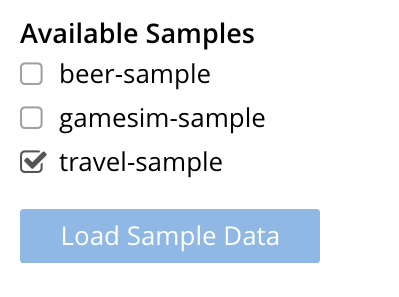Sample Buckets
You can install buckets containing example scopes, collections, and documents that you can experiment with.
Sample Buckets
Full and Cluster administrators can install sample buckets using the Couchbase Server Web Console and the REST API.
Scopes, Collections, and Sample Buckets
Scopes and Collections let you organize data within a bucket by type.
The beer-sample and gamesim-sample sample buckets store all of their data in the default scope.
The travel-sample bucket contains data in six scopes in addition to the _default scope.
These additional scopes define several collections.
The inventory scope has collections that organize travel data such as airlines and airports.
The data within the tenant_agent_00 through tenant_agent_04 scopes let you experiment with multi-tenancy applications.
The _default scope of the travel_sample bucket duplicates all of the data stored in the inventory and tenant_agent_00 through tenant_agent_04 scopes.
This duplication makes the bucket compatible with scripts and applications written for versions of Couchbase Server earlier than 7.0 that did not support scopes and collections.
|
Install Sample Buckets with the UI
From the Settings screen, select the Sample Buckets tab. The Sample Buckets screen now appears, as follows:

If one or more sample buckets are already loaded, they’re listed under the Installed Samples section of the page.
See Manage Users and Roles to learn how to assign roles to users to grant access to the sample buckets.
To install, select one or more sample buckets from the displayed list, using the checkboxes provided.
For example, select the travel-sample bucket:

If there is insufficient memory available for the specified installation, a notification appears at the lower left of Couchbase Web Console:

For information about configuring memory quotas, see General settings. For information about managing (including deleting) buckets, see Manage Buckets.
If and when you have sufficient memory, click Load Sample Data.

When installed, the sample bucket is listed under the Installed Samples section of the page. It also appears in the Buckets screen, where its definition can be edited. See Manage Buckets, for information.
Install Sample Buckets with the REST API
To install sample buckets with the REST API, use the POST /sampleBuckets/install HTTP method and URI.
For example:
curl -X POST -u Administrator:password \
http://localhost:8091/sampleBuckets/install \
-d '["travel-sample", "beer-sample"]' | jq .If successful, the call returns a JSON dictionary that lists the tasks Couchbase Server started to load the buckets:
{
"tasks": [
{
"taskId": "439b29de-0018-46ba-83c3-d3f58be68b12",
"sample": "beer-sample",
"bucket": "beer-sample"
},
{
"taskId": "ed6cd88e-d704-4f91-8dd3-543e03669024",
"sample": "travel-sample",
"bucket": "travel-sample"
}
]
}You can monitor the status of these tasks using the /pools/default/tasks REST API endpoint.
Pass it the taskId value from the task list returned by the call to sampleBuckets/install:
curl -s -u Administrator:password -G http://localhost:8091/pools/default/tasks \
-d taskId=439b29de-0018-46ba-83c3-d3f58be68b12 | jq '.'The command returns the current status of the task:
[
{
"task_id": "439b29de-0018-46ba-83c3-d3f58be68b12",
"status": "running",
"type": "loadingSampleBucket",
"bucket": "beer-sample",
"bucket_uuid": "not_present"
}
]For more information about using the REST API, including details of how to retrieve a list of available sample buckets, see Managing Sample Buckets. For information about deleting buckets (including sample buckets), see Deleting Buckets.